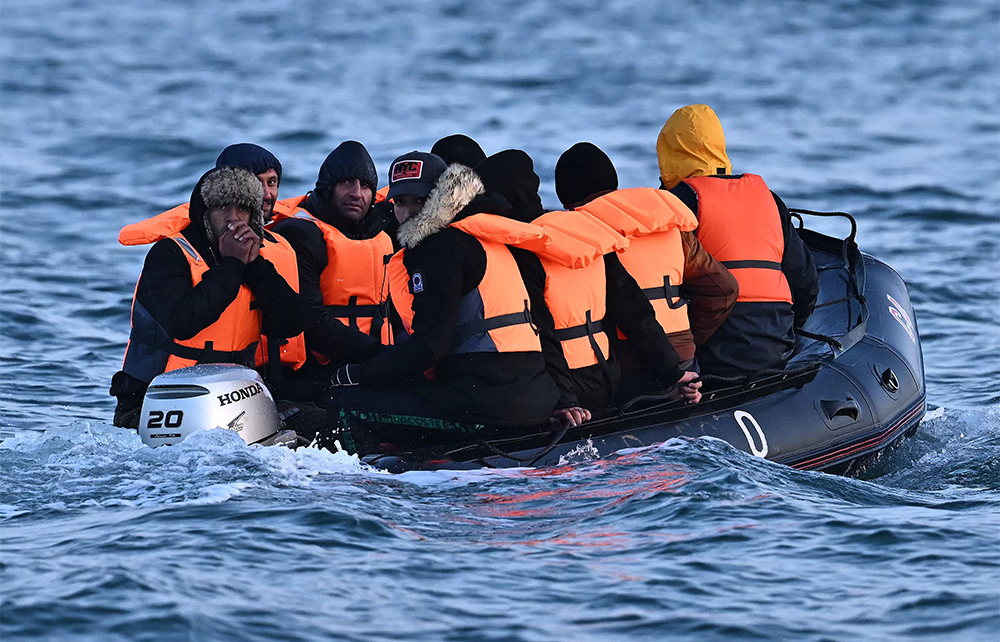Keir Starmer is advertising for someone to head his newly created Border Security Command. The salary is higher than his own: the person in charge of stopping the boats would earn between £140,000 and £200,000.
According to the ad, the job of patrolling the English Channel can be done remotely from any one of 12 cities, including Edinburgh and Belfast. It will require coordination with the Home Office, parts of the navy and even MI5. Never mind that this goes on already, with no discernible effect. The key requirement for the job, it would seem, is to be the fall guy, someone ready to take the blame for a policy that is certain to fail.
Rishi Sunak’s pledge to ‘stop the boats’ never stood a chance. This was resented by voters. One of the reasons he called an early election was because he had rashly promised that Rwanda deportations would start within months. The European Court of Human Rights looked likely to stop him and expose the whole policy as a legal absurdity. Starmer has dropped the Rwanda scheme, despite public support for it, but so far there is nothing of substance to replace it in deterring illegal migrants.
Given that appointing a leader for the Border Security Command won’t happen overnight, we can expect people-smugglers to take advantage of the situation. Small boat arrivals – there have been 15,000 so far this year – could double over the course of the summer. It’s estimated that a third of those whose asylum appeals fail come from countries with which Britain has no returns or extraditions agreement, so they would remain here anyway.
Starmer says his new organisation, whether it is headquartered on the Thames or the Firth of Forth, will hunt down gang-masters. But this would stop neither the demand for small boats nor the supply of them. The people-smugglers would carry on.
With the Rwanda scheme cancelled, the situation is as follows: anyone whose boat makes it beyond the halfway point of the Channel has a good chance of being picked up and brought the rest of the way to Britain. Once they are here, there is little prospect of them being deported. The court system is so dysfunctional that it can be easily gamed. This is a magnet for even more arrivals.
The Rwanda scheme was supposed to act as a deterrent. It was meant to send the message that Britain would help genuine asylum seekers, but if someone broke the law to arrive here, they would not be allowed to settle. It was a form of tough justice which certainly had its shortcomings. But for all its many flaws, the scheme was better than the alternative, which plays into the hands of the people-traffickers. Starmer’s decision to scrap it will only have encouraged them.
Labour has the opportunity to redefine progressive asylum policy for an era of mass migration
Yvette Cooper, the new Home Secretary, has said the Rwanda scheme was the ‘most shocking waste of taxpayer money ever’, with £700 million spent and only four migrants relocated (voluntarily) as a result of it. But the money has only been wasted because the scheme has been scrapped. There were already signs it was beginning to act as a deterrent. The Republic of Ireland had started to complain about an influx of asylum seekers travelling from Britain after changing their minds about making a claim here. Why do that if not to avoid the possibility of deportation to Rwanda?
A few other European countries have also introduced policies which involve processing asylum applications in third countries. Germany (having briefly adopted a policy of willkommenskultur that promised to accommodate any migrant who could make it there) is among those now seeking to send asylum applicants for processing in Rwanda.
During the election campaign, we heard little about Labour’s plans to do things differently. Starmer had a strategy for getting to No. 10 and it paid off in spades: he won more seats on fewer votes than any modern holder of the office. But he did not clarify how he aimed to solve many of the problems that foxed the Tories.
Labour has the opportunity to redefine progressive asylum policy for an era of mass migration. Relying on the 1951 UN Refugee Convention has led to collapse – no European country can afford to accommodate all those with a ‘well-founded fear of persecution’. A legal system based on such an outdated principle will necessarily prioritise those who can afford to make the journey, legally or illegally, rather than those who are most in need.
Britain should aim to help the maximum number of people it can, and that means helping them in locations as close to the problem country as possible. According to the UNHCR, the majority of people who have been displaced by the Syrian conflict – 12 million of them – have never left Syria. UK humanitarian efforts should be concentrated right there on the ground.
The Conservative government’s failure to tackle illegal migration contributed greatly to the party’s defeat. Labour is capitalising on that failure: Cooper spent the first eight minutes of her first speech as Home Secretary condemning the Tories’ record. They deserved it. But voters now deserve to know how she would do things better.







Comments